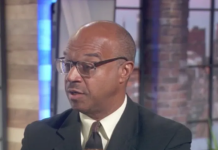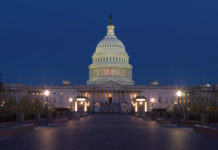The three biggest cities in Kansas battled back against telecommunications companies Thursday, saying that franchise agreements do not slow down deployment of better and faster internet service for consumers.
Officials from Wichita, Overland Park and Kansas City, Kan., told lawmakers that the telecommunications companies – AT&T, Verizon and Sprint – aren’t suffering harm from signing franchise agreements.
Their testimony came on the second day of a two-day hearing held by the Senate Utilities Committee on a bill prohibiting local governments from requiring wireless franchise agreements.
The companies say the time-consuming and costly agreements hamper their ability to expand their networks and to set the stage for new technology innovations such as 5G wireless communications.
However, city officials and their lobbyists told legislators that the franchise agreements are not preventing the deployment of small cell technology – light-weight, low-power devices placed in areas where customers experience connectivity problems.
Michael Koss, assistant city attorney for Overland Park, noted that the city has four wireless franchises with 75 small cell sites.
He said the city now has 32 permits issued for small cell sites and nine applications are pending. He said the city expects to have 100 small cell sites this year and again in 2020.
“Fiber companies, including AT&T and Verizon’s affiliates, are already installing underground fiber in the city’s right-of-way to support small cell deployment,” Koss told lawmakers. “Not just is the industry deploying small cells in Overland Park, they’re citing us as a nationwide model of pro-industry regulation.”
Koss pointed out that in a petition to the Federal Communications Commission, the industry cited 13 cities nationwide that were leaders for requiring low fees and making the application process easier for the telecoms.
Among the 13 cities: Overland Park and Olathe, he said.
“It is not true that franchises are preventing AT&T from deploying,” Koss said. “They’ve entered into small-cell agreements with cities in other states across the country.
“You’d have to ask AT&T why they think it’s important enough to provide 5G in those communities that they’ve entered into franchise agreements with, but not important enough to do so in Kansas communities.”
Bruce Ney, senior legal counsel for AT&T, said providers that signed franchise agreements did so because they had an immediate demand from consumers to address network congestion.

“Everyone wants service,” Ney said. “If you want to get that fixed and you need it right away, you have to basically cave in and agree to one of those franchises.”
But Erik Sartorius, executive director of the League of Kansas Municipalities, noted that AT&T is about to enter into a 10-year franchise agreement with Portland, paying the city $1.25 million for 150 nodes at 150 sites.
The company, he said, also has agreed to pay an extra $750 a year per node on city-owned poles with an annual 3 percent increase.
Ney said he didn’t have enough information to explain the AT&T arrangement with Portland, but he explained why Overland Park and Olathe were held out as models for wireless regulation.
“We certainly have no problem with the fees that Overland Park and Olathe charge,” Ney said. “If we held them up to the FCC as examples of something good in the state of regulation, it would certainly be their fees.
“It’s the open-ended nature of franchise agreements under the current state law that present the problems,” he said.
Mike Taylor, lobbyist for Wyandotte County’s Unified Government in Kansas City, Kan., said the telecommunication companies are seeking special treatment apart from utilities that are regulated with franchise agreements.
“We all use our cellphones and computers and want them to work at lightning speed,” Taylor said.
“But don’t forget,” he said, “these are businesses that make a lot of money selling these services, and now they are asking for special treatment, which will make these services even more profitable than they already are by using land owned by the public.”
Koss argued that the franchise agreements are critical to protecting the public right-of-way and ensuring the safe deployment of technology or utility lines.
He said in his written testimony there is a need for oversight because of “mistakes and mismanagement” by the industry.
He said providers hire out-of-state contractors at low prices based on incentives for them to complete their work quickly without “concern for safety or damage to city facilities and other utilities.”

He said that has led to cut streetlight and traffic light circuits, boring through storm-drainage pipes and damage to other utilities.
Republican Sen. Ty Masterson, chair of the Utilities Committee, said he would prefer that both sides worked out an agreement without needing the legislation.
“Right now, I’m going to try to put several of them in a room and see if they can sort it out among themselves,” Masterson said.
“I am not a big fan of government mandating one way or the other,” he said. “I would like to see an agreement between the sides.”
However, Masterson said he expects the bill to advance without an agreement.
“I don’t know what form,” he said.
















